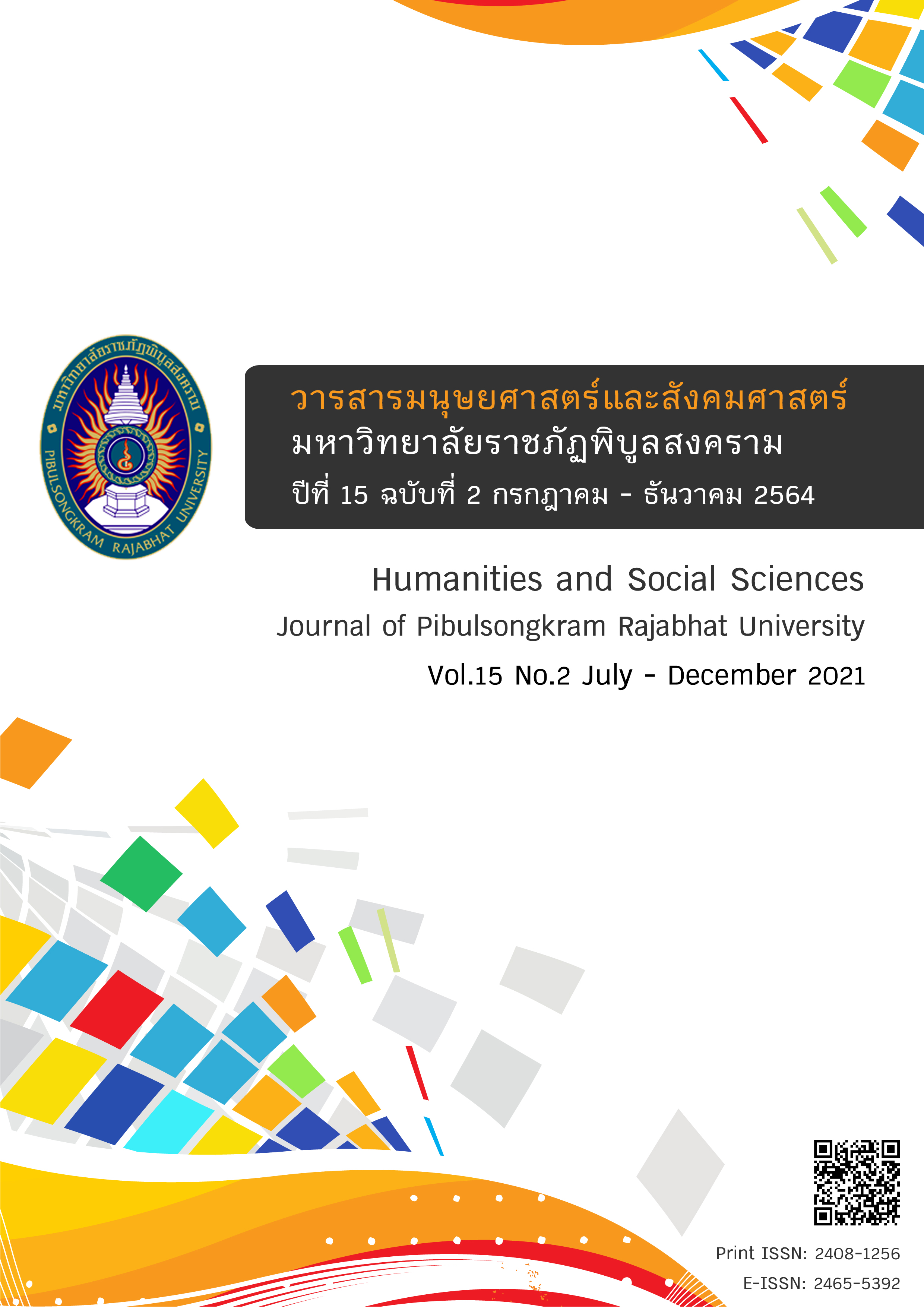Model Development of Participatory Process in Moving Forward B.W.R. Principle (Home, Temple, School) in Order to Build Strong and Sustainable Communities: Case Study of Ban Khlong Toei Community, Bueng Kok Sub-district, Bangrakam District, Phitsanulok Province
DOI:
https://doi.org/10.14456/psruhss.2021.38Keywords:
Model Development, Participatory Process, Moving Forward B.W.R. Principle (Home, Temple, School), Order to Build Strong and Sustainable CommunitiesAbstract
This research aims 1) to survey problems in moving forward B.W.R. Principle (Home, Temple, School) in order to build strong and sustainable communities, 2) to study participatory level of people in moving forward B.W.R. Principle (Home, Temple, School) in order to build strong and sustainable communities, and 3) to study model development of participatory process in moving forward B.W.R. Principle (Home, Temple, School) in order to build strong and sustainable communities: Case Study of Ban Khlong Toei Community, Bueng Kok Sub-district, Bangrakam District, Phitsanulok Province. The data collection was conducted by a quantitative research method using questionnaires given to the sample group categorized from “Taro Yamane” ready-to-use table at the deviation of .05 with 400 samples. The data were analyzed by using percentage, mean, standard deviation (S.D.). The results found that: 1) The survey of problems in moving forward B.W.R. Principle (Home, Temple, School) in order to build strong and sustainable communities demonstrated that problems of leaders from people’s views ranging from the most are temple leader, village leader, and school leader, respectively. In addition, problems of people’s participation from people’s views ranging from the most are people’s participation in religion activities, community activities, and school activities, respectively. Moreover, there is no problem shown concerning problems of government sector and private sector’s support in moving forward B.W.R. Principle (Home, Temple, School) in order to build strong and sustainable communities. 2) Participatory level of people in moving forward B.W.R. Principle (Home, Temple, School) in order to build strong and sustainable communities contained 5 aspects. It was found that overall was at a high level. When considered by each aspect, the aspect with the highest mean was the participatory aspect of information and news receiving. Next are the participatory aspect of opinion sharing and co-planning, the participatory aspect of operation and making decisions, the participatory aspect of receiving mutual benefits, and the participatory aspect of following-up and evaluation, respectively. 3) Model development of participatory process in moving forward B.W.R. Principle (Home, Temple, School) in order to build strong and sustainable communities showed that the core concept is the role of leaders-village leader, temple leader, and school leader according to B.W.R. Principle (Home, Temple, School). The community capital included local philosophers, cultures, traditions, local wisdoms which should connect community members to be as one. Moreover, what cannot be out of are supporting factors for participatory process to build strong from people community. The factors include government sector, private sector, people sector, as well as the participation of people according to B.W.R. Principle in the aspects of information and news receiving, opinion sharing and co-planning, making decisions, following-up and evaluation, and receiving mutual benefits. The most important things are being a learning community, a self-managed community, and a peaceful community. To clarify this point, being a peaceful community demonstrates how people in the community should have good heart, be qualified, and be moral in order to lead forward to build a strong and sustainable community finally.
References
กันยารัตน์ แย้มศรีแก้ว. (2558). การบริหารจัดการความร่วมมือของ บ้าน วัด โรงเรียน (วิทยานิพนธ์ปริญญาดุษฎีบัณฑิต). นครปฐม: มหาวิทยาลัยศิลปากร.
โกวิทย์ พวงงาม. (2553). การจัดการตนเองของชุมชนและท้องถิ่น. กรุงเทพฯ: บพิธการพิมพ์.
นิรันดร์ จงวุฒิเวศย์. (2550). แนวคิดแนวทางการพัฒนาชุมชน. กรุงเทพฯ: กรมการพัฒนาชุมชน กระทรวงมหาดไทย.
ปกรณ์เทพ พจี. (2549). ปัจจัยที่มีผลต่อโครงการหนึ่งผลิตภัณฑ์เพื่อการพัฒนาอย่างยั่งยืน: กรณีศึกษาหมู่บ้านเมืองบางจังหวัดหนองคาย (รายงานการวิจัย). กรุงเทพฯ: มหาวิทยาลัยเกษตรศาสตร์.
ปาริชาติ วลัยเสถียร, พระมหาสุทิตย์ อบอุ่น, สหัทยา วิเศษ, จันทนา เบญจทรัพย์, ชลกาญจน์ ฮาซันนารี. (2543). กระบวนการและเทคนิคการทำงานของนักพัฒนา. กรุงเทพฯ: สำนักงานกองทุนสนับสนุนการวิจัย.
พระราชกฤษฎีกา ว่าด้วยหลักเกณฑ์และวิธีการบริหารการบ้านเมืองที่ดี พ.ศ. 2546. (2546, 9 ตุลาคม). ราชกิจจานุเบกษา. เล่ม 120 ตอน 100 ก. หน้า 1-15.
พระวัฒธยา ฐิติสมฺปนฺโน. (2560). ความร่วมมือของบ้าน วัด และโรงเรียนในการพัฒนาสังคม ตำบลเจริญธรรม อำเภอวิหารแดง จังหวัดสระบุรี. พระนครศรีอยุธยา: มหาวิทยาลัยมหาจุฬาลงกรณราชวิทยาลัย.
ภูวณัฐสร์ หนูมาก. (2549). กระบวนการการมีส่วนร่วมของบ้าน วัด โรงเรียน (บวร) ต่อการพัฒนาโรงเรียนวิถีพุทธ (วิทยานิพนธ์ปริญญามหาบัณฑิต). กรุงเทพฯ: มหาวิทยาลัยธรรมศาสตร์.
ราเชนทร์ นพณัฐวงศกร, ทิพย์ลัดดา ชานิกุล, และยุมรี ศรีสุรัตน์. (2559). กระบวนการประชาสังคม “บวร” หลักในการพัฒนาชุมชนให้ยั่งยืน. ใน การประชุมวิชาการระดับชาติสหวิทยาการเอเชียอาคเนย์ 2559 ครั้งที่ 3. นนทบุรี: โรงแรมริชมอนด์-สไตล์ลิช คอนเวนชั่น.
สำนักงานคณะกรรมการพัฒนาเศรษฐกิจและสังคมแห่งชาติ. (2560). แผนพัฒนาเศรษฐกิจและสังคมแห่งชาติ ฉบับที่ 12 (พ.ศ. 2560 - 2564). กรุงเทพฯ: สำนักงานคณะกรรมการพัฒนาเศรษฐกิจและสังคมแห่งชาติ สำนักนายกรัฐมนตรี.
Best, J. W. (1970). Research in Education. Boston, M.A.: Allyn & Bacon.
Cronbach, L. J. (1990). Essentials of psychological testing (5th ed.). New York: Harper & Row.
Downloads
Published
How to Cite
Issue
Section
License
Any articles or comments appearing in the Journal of Humanities and Social Sciences, Rajabhat Phibulsongkram University, are the intellectual property of the authors, and do not necessarily reflect the views of the editorial board. Published articles are copyrighted by the Journal of Humanities and Social Sciences, Rajabhat Phibulsongkram University.









